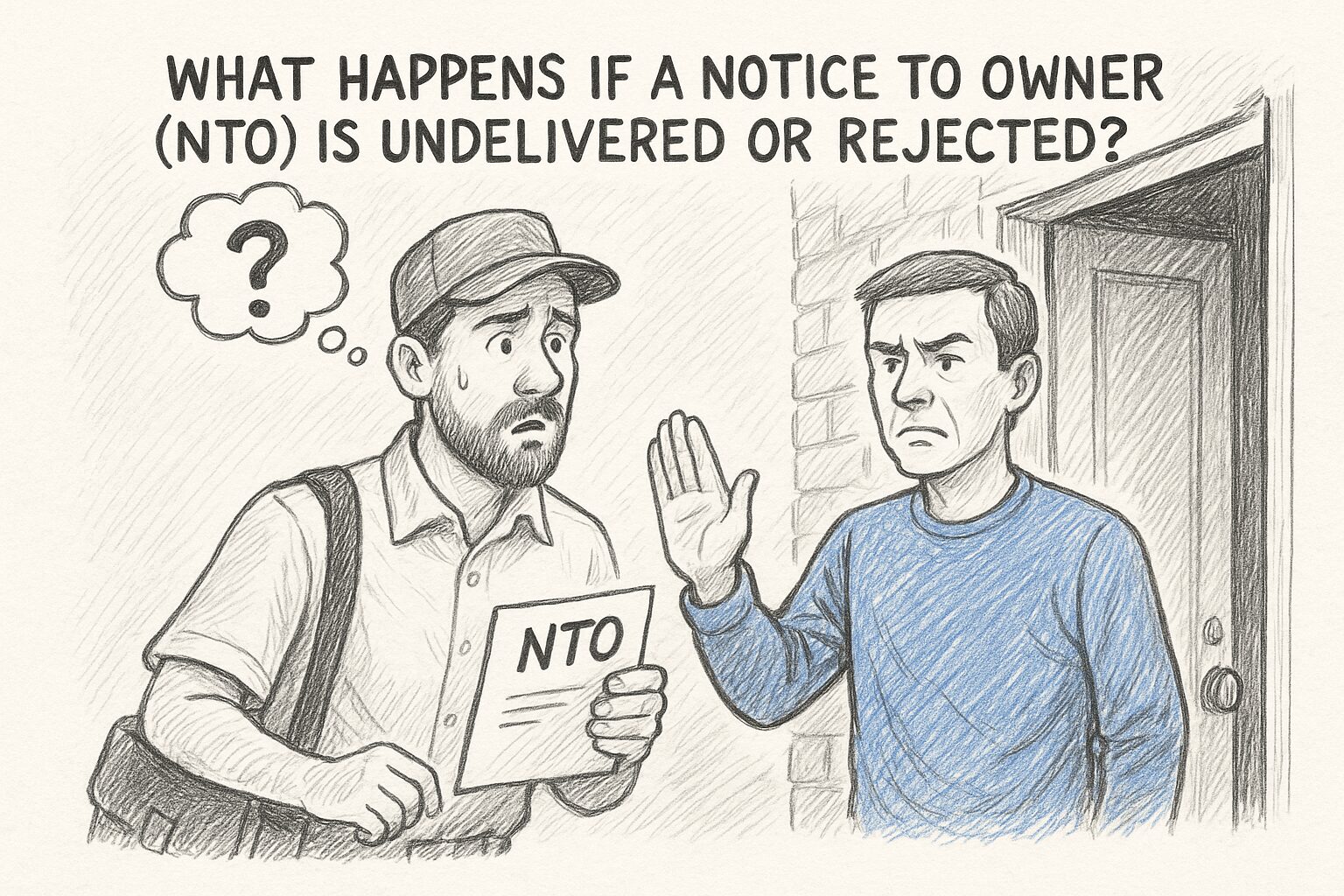Understanding Florida’s Lien Law Requirements When Service Fails
Under Florida’s Construction Lien Law (Chapter 713, Florida Statutes), certain construction professionals must serve a Notice to Owner (NTO) to protect their right to file a lien. This is not optional—missing this requirement can result in losing your lien rights and, ultimately, your ability to collect payment.
But what happens when the NTO is returned undelivered, or worse—refused by the recipient? Does that destroy your lien rights? Fortunately, Florida law accounts for these scenarios.
This guide breaks down exactly what happens when an NTO can’t be delivered, what the law says, and how to protect yourself.
Florida Law on Undelivered or Refused NTOs
Florida Statute §713.18 outlines the permitted methods for serving a Notice to Owner, including:
- Certified mail (return receipt requested)
- Hand delivery with a signed receipt
- Courier services like FedEx or UPS with proof of delivery
- Process server delivery
Importantly, the statute provides a safety net: if the NTO is properly addressed and mailed using one of these methods, it is considered served even if it’s returned undelivered or the recipient refuses to accept it.
Florida Statute §713.18(1)(c):
“If the notice is mailed to the last known address, service is effective on the date of mailing, whether or not the person accepts the notice.”
The 40-Day Mailing Rule
Florida law also presumes that an NTO is served on the date of mailing, but only if it’s mailed at least five days before the 45-day deadline—in other words, by day 40 after first furnishing labor, services, or materials.
Mailing on day 41 or later? In that case, the NTO is only considered served when it’s actually received.
PRO TIP: Always mail the NTO by day 40 to secure this legal presumption.
What If the NTO Is Returned Undelivered?
Returned NTOs can happen for a variety of reasons. These include:
- Wrong or outdated address
- The recipient moved
- Refusal of delivery
- Mail carrier error or access issues
If your NTO comes back undelivered, don’t panic—but act quickly.
Here’s what you should do:
- 1. Verify the Address: Check the Notice of Commencement, the county property appraiser, or permit records to confirm the correct mailing address for the owner and contractor.
- 2. Resend Promptly: If the address was wrong, correct it and resend the NTO using certified mail with return receipt.
- 3. Use Alternate Methods: Send additional copies via FedEx, UPS, or a process server. These are legally valid and help build your evidence.
- 4. Document Everything: Save the unopened returned envelope, USPS tracking info, and any delivery attempt notifications.
3. Does a Refused NTO Still Count as Served?
Yes! Under Florida law, refusal to accept an NTO does not invalidate service.
Florida Statute §713.18(1)(c): “Service is effective on the date of mailing, whether or not the person accepts the notice.”
PRO TIP: If you suspect the owner or contractor may refuse the NTO, send it by multiple methods (Certified Mail + UPS/FedEx + Email) and document everything.
How to Prove You Complied with NTO Requirements
Even if your NTO is returned undelivered, you need to be ready to prove that you did everything right. Here’s how:
- Keep Proof of Mailing: Save your USPS certified mail receipts and tracking numbers.
- Retain Returned Mail: Do not discard undelivered envelopes—keep them sealed with the original USPS markings.
- Use Courier Receipts: If you used FedEx, UPS, or DHL, download and store delivery attempts and tracking logs.
- Use a Process Server: Especially for large jobs, it’s smart to have a process server attempt delivery and issue a sworn affidavit if unsuccessful.
- Supplemental Contact: Although not required, email or phone confirmation can be useful backup to show intent and good faith.
5. FAQs About Undelivered NTOs
Q1: If my NTO is returned undelivered, does that mean I lose my lien rights?
No. As long as it was properly addressed and sent by an approved method, it still counts as legally served under Florida Statute §713.18(1)(c).
Q2: What should I do if my NTO is refused?
Document the refusal and send it again via an alternate method (FedEx, UPS, or a process server). You can also attempt hand delivery.
Q3: Can I send an NTO by email or fax?
Florida law does not recognize email or fax as a primary delivery method. However, it can be used in addition to an approved method for extra documentation.
Q4: What if I sent the NTO to the wrong address?
If your NTO was returned due to an incorrect address, research the correct address and resend it ASAP. This is why verifying owner and contractor details beforehand is crucial.
Q5: How do I know if the owner received the NTO?
Check your USPS tracking. If delivery was successful, you’re covered. If returned, document it and attempt other service methods.
Final Takeaways & Best Practices
To avoid disputes over NTO delivery, follow these tips:
- Mail your NTO by day 40 after first furnishing to lock in the legal presumption.
- Double-check addresses before sending.
- Send copies via multiple methods when practical.
- Keep thorough documentation of all service attempts.
- Don’t delay—resend if there’s any issue.
Florida lien law is strict—but also fair. If you follow the correct steps for mailing your NTO, your notice is legally considered served—even if it’s returned undelivered or refused. The key is mailing early, using approved methods, and documenting everything.
Disclaimer:
This article is provided for general informational purposes only and does not constitute legal advice. Reading this guide does not create an attorney-client relationship. Because lien laws are complex and fact-specific, you should consult a qualified Florida attorney for advice regarding your particular situation.



